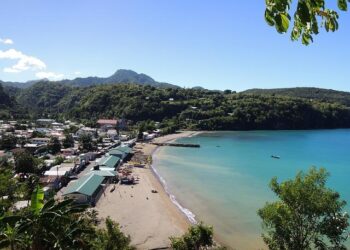Climate change poses a clear and present existential crisis to the entire world but most particularly to the small island developing states (SIDS) of the Caribbean and Pacific regions. Importantly, SIDS are also highly or extremely vulnerable to climate change in the lifetime of the current generation.
Climate change is projected to affect small states disproportionately, partly by exacerbating natural disasters and partly through more gradual effects of rising sea level. Small states will thus face much larger economic costs from climate change than larger peers.
The devastating impact on important economic sectors, like agriculture, tourism, fishery, and pressures on ecosystems will exacerbate poverty and emigration. Caribbean tourism is especially vulnerable.
Climate change is happening more rapidly than anticipated, as is evident in the rapidly increasing climate-related impacts, including but not confined to more powerful hurricanes, more frequent storms, collapsing ecosystems, record heat waves, prolonged droughts, unprecedented floods and massive forest fires.
The United Nations Framework Convention on Climate Change (UNFCCC) was established in 1992 with the objective of the “stabilisation of greenhouse gas concentrations at a level that would prevent dangerous anthropogenic interferences with the climate system”.
Signed in 2016, the Paris Agreement is a pact within the UNFCCC, the focus of which is greenhouse gas emissions mitigation, adaptation, and finance. The agreement was subscribed to by 196 governments.
The United States signed but was subsequently withdrawn by President Donald Trump. This was a major setback to the Paris Accord and to policies and funding to limit climate change caused by global warming.
What the US does is very important because first, rising temperatures are caused by industrially generated emissions from the main and largest states, namely the United States, China, and India.
Second, the international leadership of the US was missed. Third, lack of US financial contribution reduced funding to assist the countries suffering the worst and most immediate effects of climate change.
The good news is that the US has rejoined the fight against climate change under the new Joseph Biden Administration, by re-entering the Paris Accord. This was among Mr Biden’s first executive actions.
On the domestic front, the goal is to start the process to a clean energy America which aims to achieve a carbon pollution-free power sector by 2035 and a net-zero economy by 2050. Among the comprehensive raft of domestic policy measures is putting science back into policy-making by establishing the President’s Council of Advisors on Science and Technology and restoring medical science as the basis of policy on the novel coronavirus pandemic.
The new Administration has committed the US to building on the Paris Agreement’s objectives. President Biden has announced he will host a Leaders’ Climate Summit on Earth Day, April 22, 2021. Hopefully the SIDS of the Caribbean will be invited to participate, given our acute vulnerability to climate change.
Source link : https://www.jamaicaobserver.com/2021/01/30/welcome-back-to-the-paris-accord-america/
Author :
Publish date : 2021-01-30 03:00:00
Copyright for syndicated content belongs to the linked Source.











